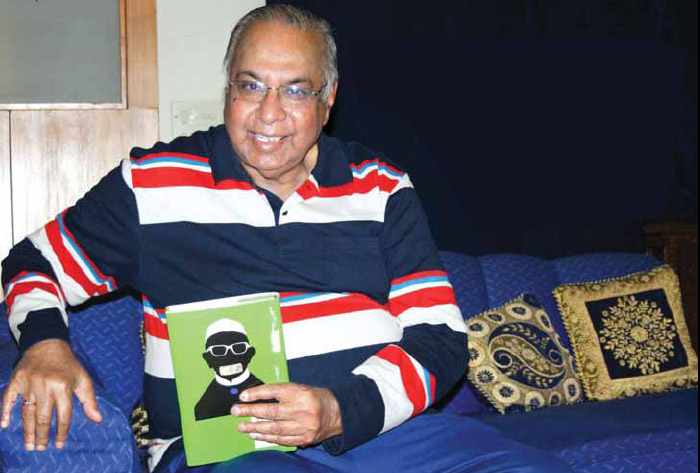IT was at an early stage of his career that Shantonu Sen, a Central Bureau of Investigation (CBI)-cadre officer recruited in the investigating agency as part of the first batch of directly recruited gazetted officers in 1963, got to know how the premier central investigative agency is used by politicians to fix political opponents and unfriendly corporates.
Sen, a Deputy Superintendent of Police (DSP) in Fraud Investigation Squad 1 of the CBI, was part of a team assigned to probe an alleged evasion of excise duty by textile mills owned by the Birla family in 1967.
“The investigation was directed to make sure that the industrial family continued to support the Congress. It had started drifting towards the Swatantra Party, a political outfit formed by C Rajagopalachari, which had emerged as the main opposition to the Congress,” the septuagenarian says.
Sen led a sub-team to conduct raids at the Gwalior, Delhi and Bhiwani textile mills. The searches were quashed and the CBI told to return the seized documents to the Birla textile empire by a court later.
Subsequently, he was also asked to take over the investigation against Manjushree Mills, Ahmedabad, which also belonged to the Birla family. He filed the chargesheet in 1975.
But, he claims, no trial took place for 34 years till March 30, 2009, when the government of the day withdrew the case.
Sen says there were allegations against the textile mills that they passed fine cloth as coarse fabric and thus evaded taxes in conspiracy with excise and textile officials. According to him, the raids achieved great success. “Has the Birla family ever gone away from the Congress?” he asks.
Sen charges the CBI with sending even weak cases for prosecution to improve its detection records. “Eighty per cent of cases are sent for prosecution. Only 10 per cent end in conviction. Poor prosecution leads to acquittal. The prosecution (in turn) blames it on evidence,” he points out.
Sen would know. After all, he served in the investigating agency for over 30 years. He also served as Director, Sikkim Vigilance Police, on deputation for two years and eight months. Beginning his career as a DSP in the Kolkata unit of the agency, he served as Superintendent of Police (SP), SP-I (now called Senior Superintendent of Police), Deputy Inspector General (DIG) and finally retired as Joint Director (Special Task Force) on April 30, 1996. He served in anti-corruption units and economic offences wings and spearheaded probes into narcotics, black marketeering and even cases related to terrorism.
Apart from the Birla textile case, he probed the role of suspects captured from the Golden Temple in Amritsar after Operation Blue Star by the Indian Army in June 1984, the Mumbai blasts case in 1993, the hawala scam, the General Vaidya assassination case, badminton player Syed Modi’s murder, the bank scam involving Harshad Mehta and the disproportionate assets case against former Sikkim Chief Minister Nar Bahadur Bhandari under whom he had served in the state. The last case resulted in the Supreme Court striking down the government’s right to withdraw concurrence for a CBI probe with retrospective effect. This was a big relief as politicians used to withdraw concurrence in cases involving them after they returned to power.
In the Operation Blue Star case, the Army handed over to the CBI a list of 1,592 persons detained from the Golden Temple. Under Sen, the CBI found that over 1,100 persons were pilgrims. The agency finally filed a chargesheet against 329 persons under Section 121 (waging war against the country) of the Indian Penal Code (IPC). The case was dropped after Prime Minister Rajiv Gandhi signed a peace accord with Akali leader Harcharan Singh Longowal.
Around this time, Sen was also made convener of a committee comprising officials from the Intelligence Bureau and states like Punjab, Haryana and Delhi which were affected by terrorism. The committee would meet twice a week in Chandigarh to exchange information. It maintained an alphabetical record of people having connections with terrorists. A number of terrorists were booked under the National Security Act (NSA). There were others against whom surveillance was mounted. Sukhdev Singh ‘Sukha’, one of the two assassins of General Vaidya, was arrested as a result of the surveillance in Pune. Sukha, along with Harjinder Singh Jinda, was hanged for the crime in October 1992.
Sen also led the probe into the Punjab National Bank (PNB) dacoity case of 1987 where a dozen terrorists had looted `5.17 million from a Ludhiana branch of the bank. Sukha (known as ‘Profit G’ in Khalistani Commando Force parlance because he would ask about benefit from every action planned by his outfit) was also an accused in the dacoity.
A week after his retirement from the CBI, Sen joined National Fertilisers Limited (NFL) as a consultant and started probing the urea scam allegedly involving then Prime Minister PV Narasimha Rao’s son, Prabhakar Rao, nephew B Sanjeeva Rao, then Fertiliser Minister Ram Lakhan Singh Yadav’s son, Prakash Yadav, and half a dozen others. Sen asserts that he was relieved of the charge when he was about to unravel the role of the politically-connected accused.
SEN served as Special Secretary to Delhi Lieutenant Governor Tejinder Khanna from January 1997 to April 1998 and, subsequently, as Officer on Special Duty (OSD) in charge of Home from April 2007 to July 2013. He worked with numerous Delhi Police Commissioners, right from YS Dadwal to KK Paul to Neeraj Kumar to BK Gupta.
Sen did not want a replication of the CBI’s prosecution rate in Delhi Police. When he got to know that the police also had a poor rate, he initiated a proposal in 2012 to create a post of Director (Prosecution) in the police with the powers to decide on prosecution in a case under Section 25 (A) of the Criminal Procedure Code (CrPC). “Singapore and Malaysia, which follow the IPC and CrPC, allow their Director (Prosecution) to decide on whether a case should be sent for trial. Why has it not been done here despite having been provided for under the CrPC?” he asks. But the proposal was shot down by the Sheila Dikshit government the same year.
In March this year, Sen (77) finished writing a book titled CBI Insider Speaks, which chronicles his experiences in the CBI and LG offices in Delhi.












































